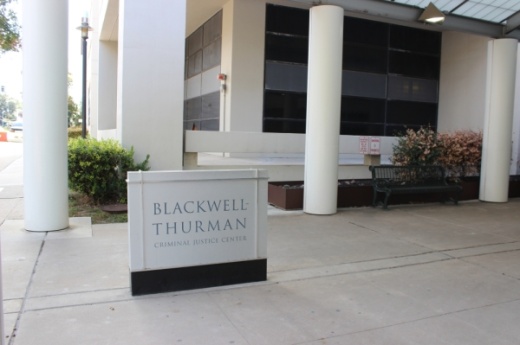The order lays out a plan to “ensure that no person is denied bond due to the inability to pay for recommended bond conditions.”
When a defendant in Travis County is released on a personal bond, he or she swears to return to court and comply with the conditions of his or her release. While there is no bond payment, there is an administrative fee.
Only an attorney or pretrial services staff person can request release on a personal bond, which must be approved by a judge, typically at a magistration hearing.
In 2018, 60% of misdemeanor defendants eligible for release on a personal recognizance bond received one, according to an Oct. 29 presentation made before the Travis County commissioners.
A defendant may be denied release on a personal recognizance bond for a number of reasons, such as a criminal history, his or her living situation, or concern about a witness’s safety.
In the order, the criminal court-at-law judges directed the county’s pretrial service department to provide financial screening results prior to magistration, which contain any relevant information regarding a defendant’s ability to pay and comply with their bond.
The order also states the criminal court administration, in collaboration with county staff, will make recommendations to the Commissioners Court to implement 24-hour attorney representation at magistration.
If implemented, this change would allow defendants to see judges—who can approve release on a personal recognizance bond—more quickly upon arrest and possibly avoid a night in jail, which can have unintended consequences, such as a lost job or the removal of one’s children.
In response, advocates said they have concerns about the order as written and are seeking clarity about what changes will be made to the pretrial release process.
“We definitely need a Version 2,” said Amanda Woog, executive director of the Texas Fair Defense Project, adding that she is hopeful that advocates and judges can work toward that end.
Their concerns center on the role pretrial services would play in determining a defendant’s eligibility and the requirement that a judge approve release at a magistration hearing.
“Anything that falls short of release before magistration is unacceptable,” Annette Price, Grassroots Leadership Criminal Justice Programs director, said in a Feb. 7 statement jointly issued by her organization, the TFDP, Texas Appleseed, the Austin Justice Coalition and the Texas Civil Rights Project.
Chas Moore, executive director of the Austin Justice Coalition, added that bail reform is important in light of recent reports that show racial disparities in arrests are widening.
Recently, Harris County instituted historic bail reforms, granting personal recognizance bonds for most misdemeanor arrestees and requiring pretrial release of all misdemeanor arrestees, excluding those accused of offenses such as domestic violence or assault.
The reforms resulted from a landmark settlement.
In 2016, three people charged with misdemeanors—which include crimes such as drug possession, theft and driving while intoxicated—filed a lawsuit against Harris County, alleging it unfairly jailed misdemeanor defendants who could not afford bail. In 2017, a federal judge declared the county’s bail system unconstitutional.
Travis County commissioners will consider the order and other initiatives proposed by the jail population monitoring group at their meeting Feb. 11.




